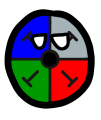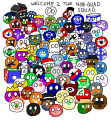 |
This page is about an important IRL ideology "This knowledge is essential to political science!" - Scientocracy This page is about an ideology that not only exists in the real world, but is also of reasonable importance. Please do not make major edits to this page without citing sources, so that it may stay accurate. |
“All I know is that I know nothing.”
Noocracy ('Rule of the Wise') also called Epistocracy ('Rule of the Knowledgeable')[1][2] is a system of government within which authority is delegated to people based on their knowledge, those people traditionally being philosophers and theologians. The concept has its origins in Ancient Greek philosophy and the concept of ![]() 'The Philosopher King'. A notable example of a Noocracy was the
'The Philosopher King'. A notable example of a Noocracy was the ![]() Roman Empire during the reign of Marcus Aurelius, who contributed to the philosophy of Stoicism.
Roman Empire during the reign of Marcus Aurelius, who contributed to the philosophy of Stoicism.
History
The first attempt to implement Noocracy was Pythagoras' city of the wise which he planned to build in Italy together with his followers. Another example of Noocracy is philosopher kings, examples of philosopher kings are Dion of Syracuse, Marcus Aurelius, Khosrow I, and Matthias Corvinus.
Beliefs
Noocracy believes in a system of governance where decision-making is in the hands of philosophers, these philosophers could be philosopher kings. Philosopher kings are rulers who possess both a love of wisdom, as well as intelligence, reliability, and a willingness to live a simple life. Noocracy also criticizes democracy for the irrationality of voters and that the average voter doesn't have the necessary knowledge to decide on means to achieve their political aims.
Variations
 Platonism
Platonism
![]() Platonism is a philosophical system that traces its roots to the ancient Greek philosopher Plato. At its core, Platonism centers around the ideas and concepts of universals or Forms. These Forms are abstract, non-material entities that exist outside of the physical world and represent the true reality of things.
Platonism is a philosophical system that traces its roots to the ancient Greek philosopher Plato. At its core, Platonism centers around the ideas and concepts of universals or Forms. These Forms are abstract, non-material entities that exist outside of the physical world and represent the true reality of things.
In the realm of Platonism, the physical world that we perceive with our senses is considered to be an imperfect reflection or copy of these perfect Forms. For example, when we encounter a particular tree in the world, according to Platonism, that tree is an imperfect instantiation of the universal Form of "treehood" that exists in a transcendent realm.
Plato believed that the material world is in a constant state of flux and imperfection, while the Forms remain eternal and unchanging. The pursuit of knowledge and understanding, according to Platonism, involves turning one's attention away from the transient world of appearances and towards the contemplation of these eternal Forms.
 Socratism
Socratism
![]() Socratism, often associated with the philosophical approach of Socrates, is characterized by a method of questioning and dialogue aimed at stimulating critical thinking and uncovering deeper insights. Instead of presenting information in a structured list format, let me explain Socratism in a more narrative style.
Socratism, often associated with the philosophical approach of Socrates, is characterized by a method of questioning and dialogue aimed at stimulating critical thinking and uncovering deeper insights. Instead of presenting information in a structured list format, let me explain Socratism in a more narrative style.
Socratism revolves around the idea that knowledge is not simply about memorizing facts but is rather a process of active inquiry and exploration. Socrates, a classical Greek philosopher, employed a dialectical method known as the Socratic method, which involved engaging in conversations with others to explore their beliefs and opinions.
In Socratic dialogues, Socrates would pose open-ended questions to his interlocutors, encouraging them to reflect on their own ideas and assumptions. He would then systematically question and challenge these ideas, pushing individuals to reevaluate and refine their understanding. The goal was not necessarily to arrive at a definitive answer but to stimulate critical thinking and self-discovery.
The Socratic method involves a relentless pursuit of truth through dialogue, emphasizing the importance of questioning assumptions, acknowledging one's ignorance, and embracing the ongoing process of intellectual exploration. Socrates famously claimed that he was wise only in recognizing his own lack of knowledge, a concept known as "Socratic irony."
 Shevchenkoism
Shevchenkoism
Taras Shevchenko was famous ukrainian poetist and writer. Central motive of his masterpiece were ![]() nationalism,
nationalism, ![]() patriotism and loyalty to his
patriotism and loyalty to his ![]() culture. Shevchenko was born in family of serfs. This fact explains nationalist and egalitarian tendencies of Taras Shevchenko.
culture. Shevchenko was born in family of serfs. This fact explains nationalist and egalitarian tendencies of Taras Shevchenko.
His political views was ![]() radical and
radical and ![]() pro-Republican. Shevchenko praised ukrainian nation and its will to independence. Despite his
pro-Republican. Shevchenko praised ukrainian nation and its will to independence. Despite his ![]() leaning left-wing positions, Shevchenko was
leaning left-wing positions, Shevchenko was ![]() culturally ambiguous. He said:
culturally ambiguous. He said:
"Learn from others, but don't shun your own"
Taras Shevchenko was ransomed from slavery by russian painter ![]() Karl Bryullov. Thereafter Shevchenko was sent into an exile and dead in Saint Petersburg.
Karl Bryullov. Thereafter Shevchenko was sent into an exile and dead in Saint Petersburg.
Shevchenkoism is ![]() left-wing and culturally
left-wing and culturally ![]() culturally center to
culturally center to ![]() center-left ideology.
center-left ideology.
 Chopinism
Chopinism
Chopinism is ![]() moderate Libertarian Right and culturally
moderate Libertarian Right and culturally ![]() centrist ideology. He based on polish composer Frederick Chopin. Chopinism is
centrist ideology. He based on polish composer Frederick Chopin. Chopinism is ![]() patriotic and
patriotic and ![]() liberal ball. He is also
liberal ball. He is also ![]() religious and
religious and ![]() cultural nationalist, because Chopin was advocating for conservation of polish folk heritage. He seems to
cultural nationalist, because Chopin was advocating for conservation of polish folk heritage. He seems to ![]() hate Russia, especially after November Uprising.
hate Russia, especially after November Uprising.
Personality and Behavior
- They usually represent whatever philosopher you want to represent in your comic,
- They love to read works on philosophy,
- They despise the Roman emperor Commodus.
How to Draw

- Draw a ball,
- Fill it with yellow,
- In the centre of the ball, in grey, draw a circle with a space on its bottom connected to two vertical lines on its upper half,
- Below this shape, again in grey, draw the same shape but inverted on its bottom half,
- Add the eyes, and you're done!
| Color Name | HEX | RGB | |
|---|---|---|---|
| Yellow | #EAC313 | 234, 195, 19 | |
| Grey | #333333 | 51, 51, 51 | |
Relationships
Friends
 Technocracy - My beloved child and heir.
Technocracy - My beloved child and heir. Transhumanism - Can be used to make people wiser.
Transhumanism - Can be used to make people wiser. Absolute Monarchism - The system many philosopher kings use.
Absolute Monarchism - The system many philosopher kings use. Enlightened Absolutism - My Enlightenment-era follower who gave me praxis and achieved my dream.
Enlightened Absolutism - My Enlightenment-era follower who gave me praxis and achieved my dream.
Frenemies
 Ingsoc - I think you're taking the "the average citizen can't make the right decision" idea just a little too far.
Ingsoc - I think you're taking the "the average citizen can't make the right decision" idea just a little too far. Aristocracy - They are pompous and foolish, but they do have the right idea about who shouldn't rule.
Aristocracy - They are pompous and foolish, but they do have the right idea about who shouldn't rule. Cyberocracy - You're smart but too unwise to actually hold power. You need to grow older and gain more experience before you are a worthy heir.
Cyberocracy - You're smart but too unwise to actually hold power. You need to grow older and gain more experience before you are a worthy heir.
 Cosmicism - You are wise, my child, and filled with an admirable desire for philosophy and progress, but you are also filled with too much dread.
Cosmicism - You are wise, my child, and filled with an admirable desire for philosophy and progress, but you are also filled with too much dread.
Enemies
 Democracy - I find your system too flawed to be sufficient for the people.
Democracy - I find your system too flawed to be sufficient for the people. Kakistocracy - By what basis do you believe the mentally daft to be just rulers of a state?
Kakistocracy - By what basis do you believe the mentally daft to be just rulers of a state? Senatorialism - Eldritch abomination. Conceptual impossibility. Your very existence violates the laws etched into the universe.
Senatorialism - Eldritch abomination. Conceptual impossibility. Your very existence violates the laws etched into the universe. Ochlocracy - Your system is an abomination.
Ochlocracy - Your system is an abomination.
Further Information
Literature
Wikipedia
References
- ↑ Epistocracy, Wiktionary
- ↑ Votes of No Confidence by Jerediah Purdy
Notes
- ↑ Plato wanted to return to pre-Democratic Athens.
- ↑ Frederick Chopin liked the folk music of Poland.
- ↑ Mozart said he is loyal to royalty and clergy. Despite this fact his opera The Marriage of Figaro has revolutionary, egalitarianist and liberal.
- ↑ Mozart was opposing to Voltaire.
- ↑ Richard Wagner had the left-wing positions in politics.
- ↑ Many of Shakespeare's plays served as propaganda for the monarchy. Examples include Richard III (Richard as a tyrant), Twelfth Night (Puritans as fools), Henry VI (Peasant rebels as Yorkist puppets), Macbeth (Usurpers as evil and influenced by witchcraft), Richard II (Promotion of Divine Right of Kings), Henry IV (Lollards mocked) & King John (Magna Carta is excluded)
Gallery
Portraits
Alternative designs
-
Legacy design
-
Legacy flag design
Artwork and Comics
| | |
| | |



